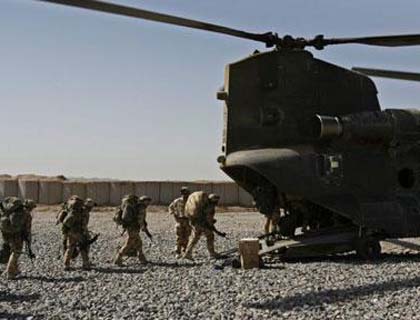The Chicago conference is about to be held where NATO members' heads will once again put the issue of Afghanistan at the core of the discussion, though the deadline for complete military withdrawal was previously set. It is likely that, unlike the rest, participants will largely focus on the exit strategies; how to withdraw with least consequences? Meanwhile, they might also emphasize and ensure Afghan people that military withdrawal should not be interpreted as abandonment of Afghanistan; they will continue their strategic and financial support, but Afghan people see the process as a cause of great concerns.
Few days ago, I called a relative and she suddenly asked me what I thought about post-2014 situation. I asked her about the reason behind her unexpected question; she replied that if there was the possibility of the country to be overruled by Taliban-led militants, then she had to leave the country. It shows how really common Afghans are worried about the possibility of breakout of civil war or Taliban's resurge.
The fragile political structure and infiltration of militant groups in Afghan National Army (ANA) are two major issues people are obsessed with. They ask, "What if the international community's sacrifices made during more than a decade perishes? What if sectarian violence creeps in or what if a war game starts in Afghanistan with any neighboring country?" Iran has already taken tough approach towards long-term strategic cooperation between Kabul and Washington.
The recent statements of Iran's Ambassador, Mr. Abul fazl Zuhrawand, regarding the strategic cooperation contract between Kabul and Washington is sign of obvious concern for Afghan people. Though his remarks stoke harsh criticism but seemingly Tehran is not going to regret for it.
Their reactions show they will try any option to force the country avoid deepening bilateral relationship between Kabul and Washington. Even after harsh reaction of both upper and lower house of the parliament, deputy to Asia and Oceania of foreign ministry, Mr. Abbas Araqchi, openly said that they put their concerns about the strategic cooperation contract and added that they are worried at first place about the security situation in Afghanistan. He claimed that the strategic cooperation would fuel instability because foreign presence would lead the society toward further radicalization.
So, if neighbors deem Afghanistan as a country they can deal with on the basis of their own conditions, that also with the presence of international community, will they avoid doing so when there would remain no giant force to tame their ambition?
If we put this problem along with, however unapproved, claims that neighbors have powerful elements within the administrative and political structure of the country, then the landscape does not look good at all.
Furthermore, the capacity of Afghan security forces to deal with Taliban-led insurgencies is doubted. The infiltration of elements inside police and national Army are the cause of great concerns.
pressure on NATO leaders to pull troops out has also been intensified by a series of incidents in which members of the Afghan security forces have turned their arms on coalition troops. As a result, Western allies are keen to bring their troops home as soon as possible.
Most analysts agree that by that yardstick, the NATO operation has been successful but if improving security for the average Afghan is the criterion by which success is measured, the answer is very different. Civilian deaths in the conflict have risen steadily in recent years, most caused by the insurgents. When issue of foreign forces withdrawal comes under the spotlight, people fear greatly of power falling to Taliban, because they have suffered a lot under their regime.
After a decade, Taliban still remain a big threat in Afghanistan, they and their allies have returned with a vengeance after their rout in December 2001,re-emerging as a fighting force and a major threat to the Afghan government. It is said that some of the militant groups have recently entered Afghanistan provinces like Konar and Norestan after being reorganized in Pakistan. So, this rag-tag guerrilla has evolved to a fairly organized band and operates in Afghanistan trying to put more pressure on the government and endanger the life and security in the country.
The reports say that the militants are thought to be only about 20,000 strong. Estimates of how many are battle-hardened vary. But despite their relatively low numbers – and despite the increasing size of the foreign troop presence –the militants have steadily extended their influence and rendered vast tracts of Afghanistan insecure.
As soon as the forces withdraw from the country, Afghan officials face sudden foreign and domestic challenges which are too hard for them to deal with. Hence, foreign officials are highly responsible for suggesting better strategies and mechanisms for Afghan people to be secure. Rather than considering exit as a solution, I think, they should take firm steps in healing the rift between themselves and Afghan Army foiling the enemies' plots as soon as possible.
It is generally acknowledged that there is a lot of external interference in the internal affairs of the country. This compounds the problems of peacekeepers. It must be kept in mind that peacekeeping is not an end in itself; it is in fact, a means to an end. Through military means, peace can hardly be achieved. Ruling Afghanistan is primarily a political problem, and as such, it should be addressed on the political front. The truth, however, is that Afghanistan cannot be stabilized easily. Under the existing scenario, what Afghanistan needs is a broad-based regime.
According to common knowledge, Afghanistan is highly dependent on the international aids, whether financial or military. Because Afghanistan is open to the intimidation of the common enemy and 'war on terror' will continue for many years so that it can bear fruit. Thus, Afghanistan with newly-organized army cannot afford accomplishing this tough mission.

